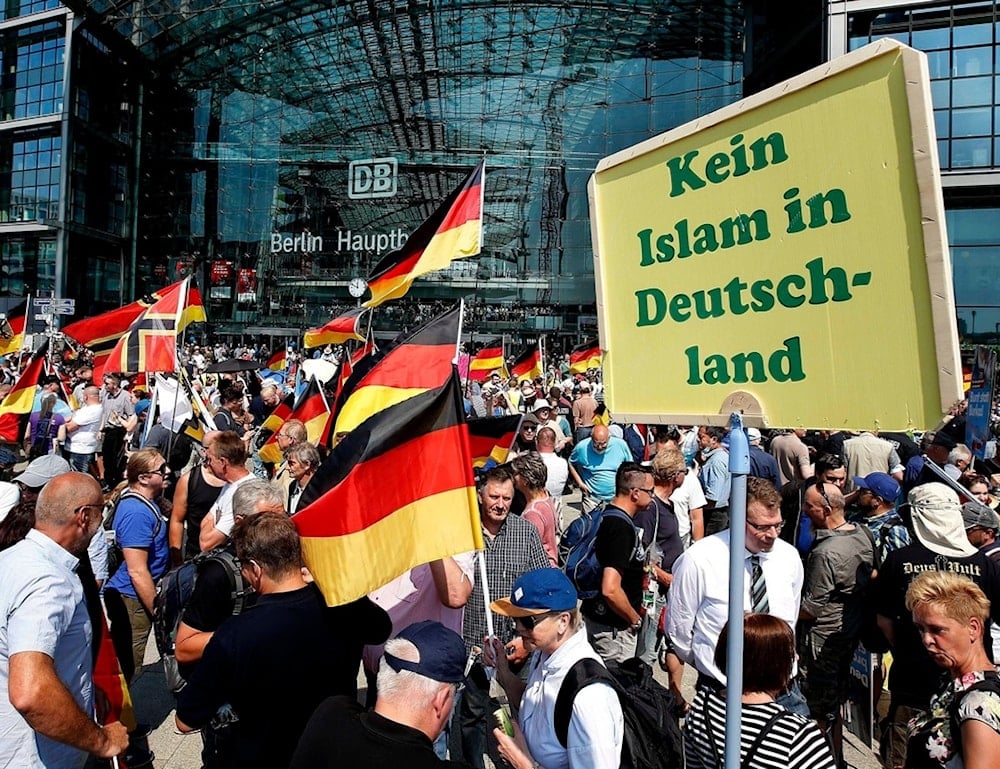AfD surges to record 27% support, overtaking Germany's ruling bloc
Germany's AfD has surged to a record 27% in national polls, overtaking Chancellor Friedrich Merz's CDU/CSU bloc amid public frustration over the economy and migration.
-

FILE - Supporters of the Alternative for Germany party wave flags in front of the train station in Berlin, May 27, 2018. The poster reads, "No Islam in Germany" (AP Photo/Michael Sohn, File)
Germany's right-wing Alternative for Germany (AfD) has climbed to an unprecedented 27% public support, becoming the country's most popular political force, according to the latest INSA poll conducted for Bild. The results convey a dramatic political realignment in Europe's largest economy, fueled by voter frustration with the government's handling of migration, inflation, and energy policy.
The survey, carried out between October 13 and 17 among 1,200 respondents, showed the AfD edging ahead of Chancellor Friedrich Merz's Christian Democratic and Christian Social Union (CDU/CSU) bloc, which trails at 25%. The Social Democratic Party (SPD) sits far behind with 14%, while The Greens and The Left each hold 11%, leaving no other parties above the 5% parliamentary threshold.
Resilient Rise
A previous INSA poll on October 7 had placed the AfD at 26.5%, itself a record high. The latest data confirms the party's steady upward trajectory, which has continued despite, or perhaps because of, mounting public scrutiny and state surveillance. In May 2025, Germany's Federal Office for the Protection of the Constitution (BfV) officially classified the AfD as a "right-wing extremist organization", giving authorities expanded powers to monitor its activities. Yet, this designation has done little to dampen the party's rise, as more Germans appear drawn to its anti-establishment and nationalist rhetoric amid economic hardship and social tensions.
The AfD has also faced multiple funding scandals, including allegations of receiving illegal donations through a network that funneled over €2 million to its campaigns, potentially incurring millions in fines. One of its prominent figures, Björn Höcke, was convicted earlier this year for using a banned Nazi-era slogan at a rally. Nevertheless, the party's leadership, particularly Alice Weidel, continues to gain popularity; Weidel recently entered Germany's top 10 most popular politicians for the first time, according to INSA.
Meanwhile, Chancellor Friedrich Merz is facing a steep decline in personal approval ratings. Recent polls show only about one-third of Germans expressing satisfaction with his leadership, following a series of policy reversals and coalition disputes. A report by Reuters noted that Merz's administration has alienated both allies and opponents after missteps on foreign policy and economic reform, eroding the CDU/CSU's credibility as a stable governing force.
Political Shift
The current political mood reflects deep public disillusionment with mainstream parties. Analysts say the AfD's appeal now stretches beyond its traditional eastern strongholds, resonating with voters nationwide who feel ignored by centrist coalitions and burdened by high living costs and migration pressures.
Germany's February snap federal election had seen Merz's bloc win 28.6% and form a coalition with Olaf Scholz's SPD, while the AfD achieved 20.8%, its best-ever result at the time. The new poll shows that the far-right movement has since surpassed all rivals, potentially positioning it as the dominant force in the next national election.
Political observers warn that the surge could mark a turning point in postwar German politics, eroding the firewall that has traditionally kept extremist parties from power.
Read more: AfD accuses Merz government of dividing Germany on Unity Day

 3 Min Read
3 Min Read










